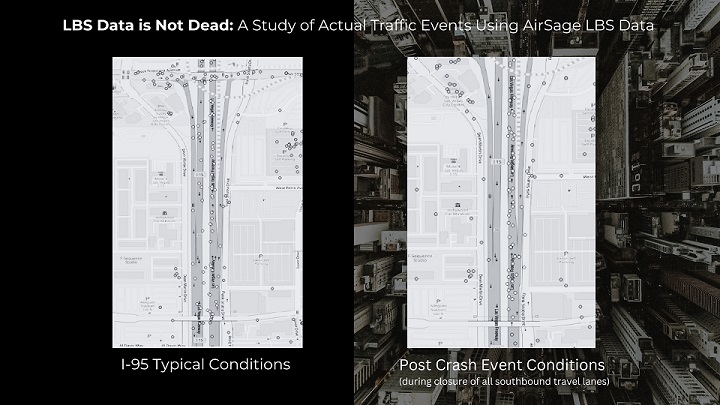AirSage
Transportation professionals widely recognize the value of location-based services (LBS) data for various purposes, such as supplementing or replacing expensive and onerous household travel surveys. However, concerns have emerged in recent years regarding the data's ability to support certain use case applications.
Reduction in Data Availability Has Caused Concerns
Specifically, the ability to derive speed, mode, or full trip trajectories from mobile device data has come under question due to changes in data availability. In this case, data availability means the number of times each device generates a GPS sighting throughout the day, and, more importantly, the temporal difference between adjacent pings.
LBS Data Continues to Have Applications in Transportation Planning
Despite this reduction in data availability, LBS data still has legitimate applications, particularly for generating origin-destination trip tables (i.e., trip matrices). It continues to provide valuable insights into flows of people, identification of home and work locations, and inference of trip purposes.
Additionally, LBS is the only source that provides insights, not only on the movement of people in cars but also as pedestrians, cyclists, and on transit, rail, and air.
Study Reveals Accuracy of LBS Data
In a recent study LBS Data is Not Dead: A Study of Actual Traffic Events Using AirSage LBS Data, the AirSage team examined closures along three different roadways: I-95 in Philadelphia, Pennsylvania, I-15 in Las Vegas, Nevada, and I-90 in Schaumburg, Illinois. They compared typical traffic conditions with post-crash event conditions using their cleansed LBS data panel. The data showed expected outcomes from the crash events with zero outliers.

The study and resulting data show that even though general data availability has decreased, the existing data, when it is appropriately sourced, processed and cleansed, still provides meaningful insight.
Conclusion
In conclusion, while concerns surrounding the use of location-based services (LBS) data in transportation planning have arisen due to changes in data availability, the data still proves valuable for certain critical transportation planning applications as long as the data is properly sourced, cleansed, and processed. As the landscape of data availability changes, it is imperative to continue exploring the potential of LBS data to enhance transportation planning, project prioritization, and decision-making.




